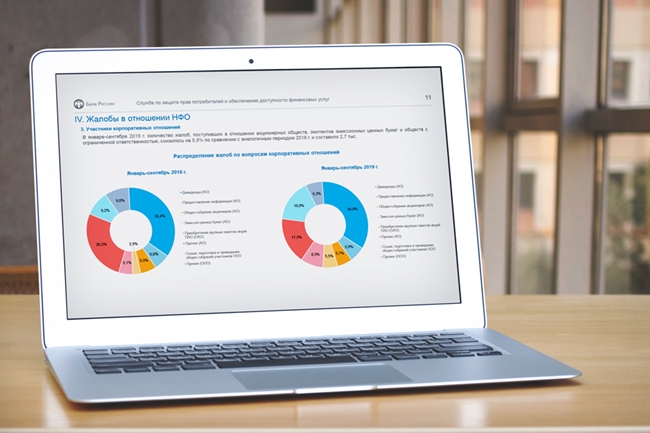Consumer awareness behind decrease in complaints received by Bank of Russia: data for 9 months 2019
In January–September 2019, the regulator received 185.2 thousand complaints from financial consumers, which is 4.2% less than over the same period last year. These are the findings of the Service for Consumer Protection and Financial Inclusion of the Bank of Russia.
Complaints against credit institutions numbered 105.6 thousand. As is customary, they exceeded one-half of all complaints sent to the regulator, totalling 57%.
Consumer and mortgage lending issues account for the largest share of complaints against banks (38.9% and 10.3% respectively). However, as compared to January–September 2018, the percentage of complaints in these segments decreased by 1.6 and 5.6 pp respectively.
Complaints against non-bank financial institutions (NFI) numbered 67.9 thousand, which is 15.3% less year-on-year. This improvement was mostly the result of a 37.2% reduction in complaints against insurance agents (IA), which came about owing to regulatory innovations and the implementation of preventive conduct supervision measures. Yet, complaints against IAs still account for the largest part (47.7%) of all complaints against NFIs received by the Bank of Russia, exceeding 32 thousand. As before, the reduction in complaints against IAs was primarily driven by OSAGO (compulsory motor third-party liability insurance) accounting for 80% of all complaints in this segment. Over 9 months of 2019, the number of complaints regarding OSAGO issues dropped by 40.3% to total 25.9 thousand.
The application of the bonus-malus coefficient (BMC) remains the main problem in the OSAGO segment accounting for more than one-half (54.4%) of all complaints on OSAGO issues. However, after the launch of the new BMC calculation procedure on 1 April 2019, the number of related complaints also decreased to 14.1 thousand, which is 36.8% less than in January–September 2018.
Over the first 9 months of 2019, the number of complaints against microfinance organisations (MFO) rose by 33.3% year-on-year, totalling 21.1 thousand. The proportion of complaints regarding violations of maximum allowable interest accrued under loan agreements increased in this segment (to 17.1%). This was largely the result of comprehensive public outreach efforts aiming to inform citizens about regulatory innovations setting the maximum allowable principal debt and daily interest amounts and about the Bank of Russia’s measures applied to reimburse amounts overpaid under consumer loan agreements to customers. August and September 2019 saw a new downward trend in complaints on the above issue, which contributed to the reduction in the overall number of complaints against MFOs received during these months.
In January–September 2019, complaints against collective investment entities numbered 2.4 thousand, which is 14.7% less than in the same period last year.
The share of complaints against credit history bureaus (CHB) increased as compared to 2018 to total 3.9 thousand. This happened against the backdrop of the expansion of channels providing credit history information. Issues associated with obtaining credit reports accounted for the majority (48.9%) of complaints against CHBs received by the Bank of Russia.
In February 2019, the regulator started to classify cross-sectoral complaints about mis-selling into a separate category – these were primarily related to investment life insurance (ILI) accounting for 44.4%. Most often, consumers submit complaints against credit institutions selling a wrong financial product instead of the desired one (62.3% of all complaints about mis-selling). However, there is currently a downward trend in complaints about this issue. A major contributor to this is the implementation of new requirements for selling life insurance policies, primarily ILI policies.
Upon consideration of the complaints received, the Bank of Russia issued 1,727 orders to financial institutions to eliminate or avoid breaches and 2,577 administrative offence reports.

